Oct 31, 2021
“Vice Versa”
By: Jordan Moody
Series: The Center of All Things
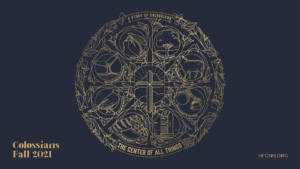
Questions for small groups or personal study.
Vice Versa | Colossians 3:1-11
#CenterofAllThings October 31, 2021
- What has already happened to believers and will happen to believers in the future according to Colossians 3:1-4? (Justification,sanctification,glorification)
- What does it mean to “set your mind on things above?” And how is this done practically? What dangers do we want avoid with the heavenly vs earthly comparison?
- Compare Colossians 3:5-10, Ephesians 4:20-24. What is meant by the process of Put off, Put On, Renew? And how is this worked out? (Rom. 8:13)
- Why do you think Colossians 3:11 so important to this passage? What’s it saying? Why is it important we don’t show partiality or discrimination in the church community especially when it comes down to sin and sanctification? What is the role of honesty, authenticity and vulnerability in this growth process of putting off sin and putting on Christ?
WatchNotesDownloadDateTitle
- Oct 31, 2021“Vice Versa”
Oct 31, 2021“Vice Versa”By: Jordan MoodySeries: The Center of All Things
 Questions for small groups or personal study. Vice Versa | Colossians 3:1-11 #CenterofAllThings October 31, 2021
Questions for small groups or personal study. Vice Versa | Colossians 3:1-11 #CenterofAllThings October 31, 2021- What has already happened to believers and will happen to believers in the future according to Colossians 3:1-4? (Justification,sanctification,glorification)
- What does it mean to “set your mind on things above?” And how is this done practically? What dangers do we want avoid with the heavenly vs earthly comparison?
- Compare Colossians 3:5-10, Ephesians 4:20-24. What is meant by the process of Put off, Put On, Renew? And how is this worked out? (Rom. 8:13)
- Why do you think Colossians 3:11 so important to this passage? What’s it saying? Why is it important we don’t show partiality or discrimination in the church community especially when it comes down to sin and sanctification? What is the role of honesty, authenticity and vulnerability in this growth process of putting off sin and putting on Christ?
- Oct 24, 2021“Escape The Shadows”
Oct 24, 2021“Escape The Shadows”By: Jordan MoodySeries: The Center of All Things
 Questions for small groups or personal study. Escape the Shadows | Colossians 2:16-23 #CenterofAllThings October 24, 2021
Questions for small groups or personal study. Escape the Shadows | Colossians 2:16-23 #CenterofAllThings October 24, 2021- What’s your main takeaway from the sermon?
- What are the shadows and what is the substance? (Col. 2:17; Heb. 10:1)
- How have you experienced the two main points, “Don’t be judged by legalists” and “Don’t be disqualified by mystics,” How did Jesus experience and deal with them?
- Why is the metaphor of viewing Christ as the Head of the body, the church, so important? What can we infer from the images of a head, body, ligaments, joints and growth etc.? (Col. 2:19 / Eph. 4:15-16)
- In 2 Corinthians, Paul does a little role playing, pretending almost to act like a “super-apostle” to point out the foolishness of self-centered boasting. Examine his message to the Corinthians and compare it to what he says to the Colossians about Christ as the Head and the Center versus the false teaching of the legalists and mystics. (Look at 2 Corinthians 11-12, particularly on 2 Cor. 11:12-12:10. I know its a lengthy passage but it helps to see his whole flow of thought and what he really ends up boasting in at the end.)
- Oct 17, 2021“In Christ Alone”
Oct 17, 2021“In Christ Alone”By: Jordan MoodySeries: The Center of All Things
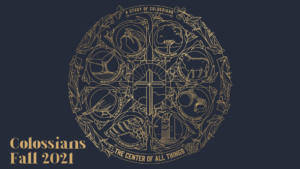 Questions for small groups or personal study. In Christ Alone | Colossians 2:6-15 #CenterofAllThings October 17, 2021
Questions for small groups or personal study. In Christ Alone | Colossians 2:6-15 #CenterofAllThings October 17, 2021- What’s your main takeaway from the sermon?
- Why do most say Col. 2:6-7 the main thesis statement for the entire letter? What is Paul saying here?
- How do you see what Paul mentions as threats to the foundation of the christian life as still relevant today? ([verse 8] threats that can take you captive: philosophy and empty deceit, human tradition, elemental spirits, things not according to Christ)
- Jesus + Nothing. What does that mean? How and why does Paul teach this in 6-15?
- Look through and discuss each place Paul uses the phrases “in him” or “with him” in Colossians 2:6-15. What does it mean to be “in Christ?”
- Oct 10, 2021“Job Description of a Christian Minister”
Oct 10, 2021“Job Description of a Christian Minister”By: Jordan MoodySeries: The Center of All Things
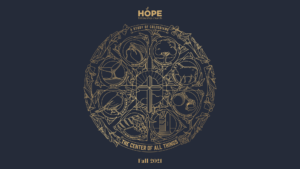 v
Questions for small groups or personal study.
Job Description of a Christian Minister | Colossians 1:24-2:5
#CenterofAllThings October 10, 2021
v
Questions for small groups or personal study.
Job Description of a Christian Minister | Colossians 1:24-2:5
#CenterofAllThings October 10, 2021
- What’s your main takeaway from the sermon?
- Which of the points from the sermon outline below stuck out to you the most? and why?
- How does this sermon and message apply to you even though you may not be a full-time minister or pastor? What part do you play in this?
- In 1:28, what does Paul mean by stating his goal to “present everyone mature in Christ?” How is the Christian life one of maturing and growing? (microwave or crockpot) Compare Eph. 4:11-14; Phil. 3:13-14; Col. 1:28.
- Paul says he has a great struggle for them and then goes on to list words of his prayer for them and the church at Laodicea. Examine his prayer and discuss what he prays for. (Col. 2:1-3)
- Oct 3, 2021“Paramount”
Oct 3, 2021“Paramount”By: Jordan MoodySeries: The Center of All Things
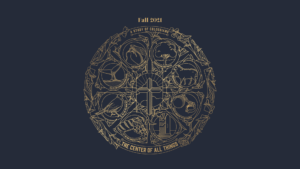 Questions for small groups or personal study. Paramount | Colossians 1:15-23 #CenterofAllThings October 3, 2021
Questions for small groups or personal study. Paramount | Colossians 1:15-23 #CenterofAllThings October 3, 2021- What’s your main takeaway from the sermon?
- What do these passages have in common and why? Col. 1:15-20; John 1:1-5; 1 John 1:1–3; Heb. 1:1–4
- Why is it so important that Jesus is not a created being and is transcendent above all things and yet also took on flesh and dwelt among us? Why do you think this so crucial for our reconciliation and redemption?
- Look at and discuss the two slides describing the “mythological worldview” and the “biblical worldview.” What is the difference between the two and what do you think this means? (the slides were used during the service and are posted online)
- How can we remain “stable and steadfast” in these things and continue to keep Christ as the center of all things in our life and the life of our church? (1:23)
- Sep 26, 2021“Praying For You”
Sep 26, 2021“Praying For You”By: Jordan MoodySeries: The Center of All Things
 Questions for Small Groups and Personal Study
I’m Praying For You | Colossians 1:9-14
#CenterofAllThings September 26, 20211.Share with the group one main takeaway from the sermon. What impacted you or stuck out to you? 2. Share with the group a time when prayer became an essential part of your life, either you prayed for others or others prayed for you? 3.What should “I’m praying for you” really mean in a church community? 4. Look at and review the content of Paul’s prayer in Col. 9-14. What does he pray for specifically? How is his prayer similar or dissimilar from our own prayer lives or prayer habits? 5. Verse 9 uses words like “knowledge, wisdom and understanding” and then ties those words to a physical walking and outward lifestyle that is pleasing to God. What is the connection between our knowledge of God and our daily lifestyle? What is the danger of disconnecting knowledge and understanding of God from our lifestyle and ethics? 6.Paul says a life fully pleasing to God is a life “bearing fruit, increasing in knowledge, being strengthened with power, and giving thanks.” How do these phrases describe an overview of a truly Christian life? In what ways do you see or you would like to see this being worked out in your own life? Spend some time in prayer. You could have each person pray for 2 or 3 specific things. You could try praying some of the exact words and phrases Paul uses in Colossians 1. When we don’t know how to pray or what to pray; I find letting scripture inform our prayers is a great place to start.
Questions for Small Groups and Personal Study
I’m Praying For You | Colossians 1:9-14
#CenterofAllThings September 26, 20211.Share with the group one main takeaway from the sermon. What impacted you or stuck out to you? 2. Share with the group a time when prayer became an essential part of your life, either you prayed for others or others prayed for you? 3.What should “I’m praying for you” really mean in a church community? 4. Look at and review the content of Paul’s prayer in Col. 9-14. What does he pray for specifically? How is his prayer similar or dissimilar from our own prayer lives or prayer habits? 5. Verse 9 uses words like “knowledge, wisdom and understanding” and then ties those words to a physical walking and outward lifestyle that is pleasing to God. What is the connection between our knowledge of God and our daily lifestyle? What is the danger of disconnecting knowledge and understanding of God from our lifestyle and ethics? 6.Paul says a life fully pleasing to God is a life “bearing fruit, increasing in knowledge, being strengthened with power, and giving thanks.” How do these phrases describe an overview of a truly Christian life? In what ways do you see or you would like to see this being worked out in your own life? Spend some time in prayer. You could have each person pray for 2 or 3 specific things. You could try praying some of the exact words and phrases Paul uses in Colossians 1. When we don’t know how to pray or what to pray; I find letting scripture inform our prayers is a great place to start. - Sep 19, 2021“The Center of All Things”
Sep 19, 2021“The Center of All Things”By: Jordan MoodySeries: The Center of All Things
 Questions for small groups or personal study. Center of All Things | Colossians 1:1-8 #CenterofAllThings September 19, 2021
Questions for small groups or personal study. Center of All Things | Colossians 1:1-8 #CenterofAllThings September 19, 2021- Why is Paul writing the letter of Colossians? What is the occasion and purpose of the letter? Where is Paul writing this letter from? Who is Epaphras? (Col. 1:7)
- How and why is Christ the center of all things and what implications does this have for our lives today? (Col. 1:15-17)
- Some have said Colossians is the most Christ saturated letter in the NT. Skim through the book of Colossians and find phrases of “in Him” “in whom” “in Christ.” Discuss what these phrases mean and how they are used throughout the letter.
- Why do you think Paul so often in his writing focuses on three key virtues: Faith, Hope and Love? Why these three? And then why does he change the order and list them in the order of faith, love and hope in Col. 1:4-5. What is he specifically saying about Hope here? (other places of these three virtues: 1 Cor. 13:13; 1 These. 1:3)
- What item below stands out to you the most and why? Feel free to discuss this list or use it in your personal study later on this week. Jesus is the Center of redemption (Col. 1:13-14) / Center of all things (Col. 1:16-17) / Center of the church (Col 1:24) / Center of our hope (Col. 1:27) / Center of our growth (Col. 1:28) / Center of our faith (Col. 2:6-7) / Center of our religion (Col. 2:17) / Center of our resurrection (Col. 3:1) / Center of our life (Col. 3:3-4) / Center of our peace (Col. 3:15) / Center of households, workplaces (Col. 3:18-4:1)
- Sep 12, 2021Finding God in a Dry Land
Sep 12, 2021Finding God in a Dry LandBy: Josh PratherSeries: Finding God in a Dry Land
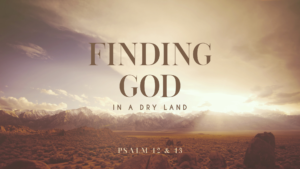 Small Group Questions – Psalms 42 and 43Read Psalms 42 & 43
Small Group Questions – Psalms 42 and 43Read Psalms 42 & 43- What condition is the psalmist experiencing in Psalm 42:1-2? If the writer himself is likened to a deer, what do the dried up “streams” represent?
- Since the cause was not sin, what elements appear to have triggered the psalmist’s condition? Look through the entire psalm (that is, both Psalms 42 and 43).
- How might each “trigger” factor noted in Q.2 apply to you today?
- What does the psalmist do to face this condition?
- Psalms 42 & 43 point us to the true hope we can have in the midst of trouble. What is that hope and how does the Gospel of Jesus help deepen our understanding of that hope?
- Sep 5, 2021“S2 Episode 4: Epilogue”
Sep 5, 2021“S2 Episode 4: Epilogue”By: Jordan MoodySeries: Long Story Short
 Questions for small groups or personal study. Season 2 Episode 4: Epilogue #LongStoryShort September 5, 2021
Questions for small groups or personal study. Season 2 Episode 4: Epilogue #LongStoryShort September 5, 2021- Summarize and talk through the whole story of the Bible by walking through our series from beginning to end. Talk through the plot, flow, movements, high points and low points. —Season 1— Creation, Fallout, Abraham, Israel , Moses, Joshua, David, Divided Kingdom, Prophets , Intermission —Season 2— Messiah, Gospel, Church, Epilogue.
- What are the present implications for our living today when we consider our eternal destination in light of a “new heaven and new earth” versus thinking only about heaven? What do you think the new heaven and new earth will be like? Why is the Bible communicate with these terms of new heavens and earth? What do we have to look forward? (Isa. 65: 17, Isa. 66:22, 2 Peter 3:13)
- Compare the beginning of the Bible and the end of the Bible. How are they similar and what has changed? Gen. 1:1 and Rev. 21:1 / Gen. 2:9 and Rev. 22:1-2.
- What is the purpose of the book of Revelation? What are your current thoughts and reactions to the book of Revelation? What misconceptions do you think we have when reading and interpreting Revelation?
- How does Revelation 22:20 encourage and motivate you today?
- Aug 29, 2021“S2 Episode 3: Church” Josh Prather
Aug 29, 2021“S2 Episode 3: Church” Josh PratherBy: Jordan MoodySeries: Long Story Short
 Questions for small group and personal study. Long Story Short Season 2 Episode 3: Church August 29, 20211. What is the first thing that comes to mind when you think of church? What were your first/early experiences of attending church? Were those positive or negative experiences in your faith journey and why?2. According to Galatians 6:10 and Ephesians 2:19, the church is described as a ___________ of faith, or in other words, a family. With that imagery in mind, how should members of the church treat one another? What ingredient, according to 1 Cor. 13:13, is the most necessary glue?3. How has the church been like a family to you?4. Two other ways God describes the church are found in 1 Corinthians 12:25, which pictures the church as ______________, and Ephesians 2:20-22, which pictures the church as _______________. What valuable lessons about the church should we learn from these points of emphasis?5. In the sermon we discussed the mission of the church being built out of the mission of God. What are the key ways this happens? Why is this important to note as you consider the entire biblical narrative and God’s redemptive plan?6. What dimension of the church’s mission stood out to you? Why? (Upward, Inward, Backward, Forward, Outward)
Questions for small group and personal study. Long Story Short Season 2 Episode 3: Church August 29, 20211. What is the first thing that comes to mind when you think of church? What were your first/early experiences of attending church? Were those positive or negative experiences in your faith journey and why?2. According to Galatians 6:10 and Ephesians 2:19, the church is described as a ___________ of faith, or in other words, a family. With that imagery in mind, how should members of the church treat one another? What ingredient, according to 1 Cor. 13:13, is the most necessary glue?3. How has the church been like a family to you?4. Two other ways God describes the church are found in 1 Corinthians 12:25, which pictures the church as ______________, and Ephesians 2:20-22, which pictures the church as _______________. What valuable lessons about the church should we learn from these points of emphasis?5. In the sermon we discussed the mission of the church being built out of the mission of God. What are the key ways this happens? Why is this important to note as you consider the entire biblical narrative and God’s redemptive plan?6. What dimension of the church’s mission stood out to you? Why? (Upward, Inward, Backward, Forward, Outward) - Aug 22, 2021“S2 Episode 2: Gospel”
Aug 22, 2021“S2 Episode 2: Gospel”By: Jordan MoodySeries: Long Story Short
 Questions for small groups or personal study. Season 2 Episode 2: Gospel #LongStoryShort August 22, 2021
Questions for small groups or personal study. Season 2 Episode 2: Gospel #LongStoryShort August 22, 2021- Look at the Great Commission and discuss the implications for all of us today? Break down and discuss each facet of the commission. How is the church the vehicle for this? Matt. 28:19-20
- What is the gospel? What parts of the gospel message are absolutely vital for it to remain the gospel? What are modern distortions of it?
- How is Acts a continuation of the mission and message of Jesus? Discuss the foundation of the church and the role the Holy Spirit plays through Acts.
- How is Acts transitional in the greater timeline and storyline of the Bible?
- Discuss the expansion of the gospel as it follows the directions given in Acts 1:8. (Expansion to the Jewish believers and the coming of the Spirit in Acts 2 and the inclusion of the Samaritans Acts 8 and the inclusion of the Gentiles in Acts 10.)
- Aug 15, 2021“S2 Episode 1: Messiah”
Aug 15, 2021“S2 Episode 1: Messiah”By: Jordan MoodySeries: Long Story Short
 Questions for small groups or personal study. Season 2 Episode 1: Messiah #LongStoryShort August 15, 2021
Questions for small groups or personal study. Season 2 Episode 1: Messiah #LongStoryShort August 15, 2021- Discuss the flow and plot line of the Bible using Freytag’s pyramid (slide/diagram can be found online). Exposition, rising action, climax, falling action, resolution. Where do we find ourselves on this diagram today?
- What does Jesus’ name mean? What does Christ mean? How is the concept of anointing related to prophets, priests, and kings in the OT and how is this significant in relation to Jesus Christ?
- How does Jesus fulfill the office of prophet, priest and king? (places to start: prophet: Mark 1:14-15; Priest: Heb. 9:11-15; 7:22-28; King: John 19:1-3, Rev. 19:16)
- What does the Messiah actually accomplish for us through his life, death and resurrection? List everything Jesus does from these following passages: (example: Jesus forgives, Jesus redeems… etc.) You may use any number of these passages: (
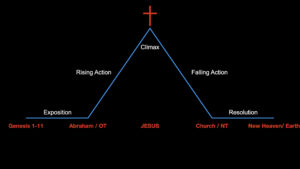
- Aug 8, 2021“S1 Episode 10- Intermission”
Aug 8, 2021“S1 Episode 10- Intermission”By: Jordan MoodySeries: Long Story Short
 Questions for small groups or personal deeper study. S1 Episode 10: Intermission #LongStoryShort August 8, 2021Reminder of the sermon outline:
Questions for small groups or personal deeper study. S1 Episode 10: Intermission #LongStoryShort August 8, 2021Reminder of the sermon outline:- The People have broken the covenant/law —> God answers: Isa. 53 and Jeremiah 31:31-34
- The People are conquered —> God answers: Jeremiah 29 and Daniel
- The People are lost and scattered —> God answers: Ezekiel 34:15-16; Jer. 31:10; Isa. 40:11
- The Presence has left the building —> God answers: Eze. 11:16-21, Eze. 37; Ez. 47:1-12
- As we approach the “intermission” between the seasons/acts/testaments, what questions and problems do you feel are still unresolved? Set the scene. What still needs to happen? What signs do we have as to what is coming?
- Can you condense and communicate the overall message of the prophets to the people of Israel? What is God saying to them through the movements and changes in their history? From the Divided Kingdom to Exile and Captivity to Return and Rebuild?
- Discuss the motif of the shepherd. Think of how many places shepherds are mentioned and used throughout scripture. In what ways is God our shepherd and what does that entail? (Ezekiel 34:15-16; Jer. 31:10; Isa. 40:11; Psalm 23; John 10:14)
- What is the significance of Ezekiels final verse and the name of this city? (Ezekiel 48:35) Now compare this to Revelation 21:3.
- We didn’t get time for it in this series, but what was the role of Ezra, Zerubbabel, Nehemiah and Haggai? Who were they and how did God use them?
- Aug 1, 2021“S1 Episode 9- Prophets”
Aug 1, 2021“S1 Episode 9- Prophets”By: Jordan MoodySeries: Long Story Short
 Questions for small groups or personal deeper study. S1 Episode 9: Prophets #LongStoryShort August 1, 2021
Questions for small groups or personal deeper study. S1 Episode 9: Prophets #LongStoryShort August 1, 2021- How familiar are you with the major and minor prophets? What do you find intriguing about them? What do you find difficult and confusing about this type of literature and part of the Bible?
- How is reading Prophecy and the Prophets different than other parts of scripture? How do we navigate the near and far fulfillment of some the messages preached?
- Take some time and explore some of the prophets. Pick two or three books. Locate and identify the pattern “Repent - Return - Warning - Hope” in a few of the minor prophets of your choosing. (You can skim a few of them and identify chapter headings to get a gist of the message and flow. Joel and Amos are good places to start).
- What do we learn about God from these verses: Joel 2:25-29; Habakkuk 3:17-19; Hosea 2:19-23; Zeph. 3:17; Micah 7:18-20. Do these passages change your conception or misconception of God?
- What is the role of the prophets in the meta-narrative/grand story of the Bible?
- Jul 25, 2021“S1 Episode 8: “A Kingdom Divided” Josh Prather
Jul 25, 2021“S1 Episode 8: “A Kingdom Divided” Josh PratherBy: Jordan MoodySeries: Long Story Short
 v
SERMON QUESTIONS:
v
SERMON QUESTIONS:
- King Solomon became distracted and fell in love with the things God hates. What distractions (even good things) might be winning over our affections? (1 Kings 11:9-13)
- What can we learn about the importance of our personal walk with God along with our influence of others from the example of Jeroboam and David?
- One of Ahab’s biggest criticisms was his acceptance of sin and denial of God. What sins has our culture deemed acceptable? What sins do we overlook/excuse in our own lives? How might we turn from our sin and follow after God?
- God makes it clear that His people were to follow Him alone. While we don’t typically struggle with idol worship like they did in the Old Testament, what are some things we can elevate above God in our lives? What might help draw our hearts back to God?
- Israel was to be the light of God to the nations that surrounded them. How can we, as the church, be the light of Jesus to our communities, neighbors, coworkers, and families?
- Jul 18, 2021S1 Episode 7: David-1Samuel-2 Chronicles
Jul 18, 2021S1 Episode 7: David-1Samuel-2 ChroniclesBy: Jordan MoodySeries: Long Story Short
 Questions for small groups or personal deeper study. S1 Episode 7: David 1 Samuel - 2 Chronicles #LongStoryShort
Questions for small groups or personal deeper study. S1 Episode 7: David 1 Samuel - 2 Chronicles #LongStoryShort- Examine the prayer of Hannah in 1 Samuel 2. What themes do you draw from it? In what ways is verse 9 almost like a prophetic microcosm of the rest of Israel’s history?
- Compare and contrast the characters: Hannah, Eli, Samuel, Saul, David, Solomon.
- Read 1 Samuel 3:1-3. What is the state of the nation at that time?
- Man looks on the outward but God looks on the heart (1 Samuel 16:7). How does God demonstrate this truth through Hannah, Samuel, Saul and David?
- Trace the significance of the temple location through these three passages. Gen. 22:1-2, 1 Chron. 21:18-23; 2 Chron. 3:1-3.
- Read through Ephesians 2:12-22. What Temple/tabernacle metaphors and pictures is Paul using to describe the new relationship we have through Jesus as the church. How is the church like a temple?
- Jul 11, 2021“S1 Episode 6: Joshua”
Jul 11, 2021“S1 Episode 6: Joshua”By: Jordan MoodySeries: Long Story Short
 Joshua 5:13-15 Joshua 1:10-15 Hebrews 4:8-11 Judges 1:6-10Questions for small groups or personal study. S1 Episode 6: Joshua (Joshua, Judges, Ruth) #LongStoryShortOutline Overview:
Joshua 5:13-15 Joshua 1:10-15 Hebrews 4:8-11 Judges 1:6-10Questions for small groups or personal study. S1 Episode 6: Joshua (Joshua, Judges, Ruth) #LongStoryShortOutline Overview:- Victorious Rest - Joshua
- Cyclical Rebellion- Judges
- Hopeful Redemption - Ruth
Survey Overview: As a group, give a survey of what you know about Joshua, Judges and Ruth. (Major plots, figures, and events.)- Joshua 1:10-15 speaks of rest. Hebrews 4:8-11 speaks of rest. Compare and contrast these two passages. What kind of rest is being described?
- Discuss God’s judgment and mercy here with Jericho and Rahab. (Joshua 2:11-14 and Hebrews 11:30)
- Judges 2:6-10 describes the failure to train up the next generation. How can we avoid this today? Look at Deut. 6:1-15 for the explicit warnings and commands the people ended up ignoring in Judges.
- What is redemption? How is redemption pictured in the story of Ruth?
- What is so significant about the ending of Ruth? Ruth 4:18-22 (extra credit: who is Perez in verse 18? Why is he significant? Also, check out Matt. 1:2-6)
- Jul 4, 2021“S1 Episode 5: Moses/Exodus
Jul 4, 2021“S1 Episode 5: Moses/ExodusBy: Jordan MoodySeries: Long Story Short
 Questions for small groups or personal deeper study.
S1 Episode 5: Moses (Exodus) #LongStoryShort1. Why do you think God uses the 10 plagues and the parting of the Red Sea to liberate his people? Why this way?2. Why did God give Israel the law? What purposes do we see in the Law? What does Galatians 3:24 have to say about this?
3. What is meant by Jesus when he says he has not come to abolish the law but to fulfill it?
4. Read Hebrews 7:23-28. (Melchizedek comes up again in this chapter;) But what is so significant about Jesus being our eternal priest and sacrifice? Why is this actually better than Old Testament priests and sacrifices?
5. Describe the tabernacle and its contents. What do you think is represented by the furniture and items inside it and it’s construction. (Exodus 25-31)
6. Read Exodus 24 and imagine what it would have been like to behold God upon the mountain in all his glory? Discuss his glory. His holiness. His power. His personal relationship with Israel and Moses. Now describe our relationship and view of God today.
7. What is meant by Jesus being our Passover Lamb? (1 Cor. 5:7; 1 Peter 1:18-20; John 1:29)
Questions for small groups or personal deeper study.
S1 Episode 5: Moses (Exodus) #LongStoryShort1. Why do you think God uses the 10 plagues and the parting of the Red Sea to liberate his people? Why this way?2. Why did God give Israel the law? What purposes do we see in the Law? What does Galatians 3:24 have to say about this?
3. What is meant by Jesus when he says he has not come to abolish the law but to fulfill it?
4. Read Hebrews 7:23-28. (Melchizedek comes up again in this chapter;) But what is so significant about Jesus being our eternal priest and sacrifice? Why is this actually better than Old Testament priests and sacrifices?
5. Describe the tabernacle and its contents. What do you think is represented by the furniture and items inside it and it’s construction. (Exodus 25-31)
6. Read Exodus 24 and imagine what it would have been like to behold God upon the mountain in all his glory? Discuss his glory. His holiness. His power. His personal relationship with Israel and Moses. Now describe our relationship and view of God today.
7. What is meant by Jesus being our Passover Lamb? (1 Cor. 5:7; 1 Peter 1:18-20; John 1:29) - Jun 27, 2021“Season 1 Episode 4 -Israel”
Jun 27, 2021“Season 1 Episode 4 -Israel”By: Jordan MoodySeries: Long Story Short
 Questions for small groups or personal deeper study.
S1 Episode 4 Israel (Genesis 25-Exodus 3) #LongStoryShortHere are the passages from the major movements from the sermon:Genesis 25:21-28 - Birth of Jacob and Esau
(Gen. 50:20-21 - God works it out for good)
Genesis 27:18 - Jacob’s deception for the birthright
Genesis 28:12-16 - Jacobs ladder
Genesis 32:24-31 - Jacob/Israel wrestles
Gen. 50:24-25 - Joseph’s bones
Exodus 1:8 - King didn’t know Joseph.
Exodus 3:13-15 - God’s name
Exodus 3:7-8 - God comes down1. Talk through the movements as they are listed above from the sermon. What story stuck out to you? How does it fit in to the meta narrative of the Bible? Does it point us to Jesus in anyway?
2. Often, God chose the younger instead of the older/firstborn to receive his blessing. Why do you think this is? What do we learn from this pattern?
3. Think of as many stories in the Bible where God works in unexpected ways that is contrary to the prevailing wisdom of man. (David and Goliath example #1, Jacob chosen instead of Esau example #2)
4. Why is John 1:50-51 so significant and what is Jesus saying here?
5. Why do you think God changes Jacob’s name to Israel? Why do you think this took place in the manner and sequence that it did and why a wrestling match of all things? What do you think is being communicated here through this story?
6. Discuss the significance of God revealing his name as “I AM WHO I AM”
7. Extra credit: Genesis 50:24-26 — Joshua 24:32. How cool are these verses?
Questions for small groups or personal deeper study.
S1 Episode 4 Israel (Genesis 25-Exodus 3) #LongStoryShortHere are the passages from the major movements from the sermon:Genesis 25:21-28 - Birth of Jacob and Esau
(Gen. 50:20-21 - God works it out for good)
Genesis 27:18 - Jacob’s deception for the birthright
Genesis 28:12-16 - Jacobs ladder
Genesis 32:24-31 - Jacob/Israel wrestles
Gen. 50:24-25 - Joseph’s bones
Exodus 1:8 - King didn’t know Joseph.
Exodus 3:13-15 - God’s name
Exodus 3:7-8 - God comes down1. Talk through the movements as they are listed above from the sermon. What story stuck out to you? How does it fit in to the meta narrative of the Bible? Does it point us to Jesus in anyway?
2. Often, God chose the younger instead of the older/firstborn to receive his blessing. Why do you think this is? What do we learn from this pattern?
3. Think of as many stories in the Bible where God works in unexpected ways that is contrary to the prevailing wisdom of man. (David and Goliath example #1, Jacob chosen instead of Esau example #2)
4. Why is John 1:50-51 so significant and what is Jesus saying here?
5. Why do you think God changes Jacob’s name to Israel? Why do you think this took place in the manner and sequence that it did and why a wrestling match of all things? What do you think is being communicated here through this story?
6. Discuss the significance of God revealing his name as “I AM WHO I AM”
7. Extra credit: Genesis 50:24-26 — Joshua 24:32. How cool are these verses? - Jun 20, 2021” S1 Episode 3: Abraham”
Jun 20, 2021” S1 Episode 3: Abraham”By: Jordan MoodySeries: Long Story Short
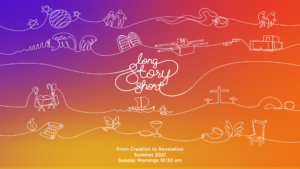 Questions for small groups S1 Episode 3: Abraham (Genesis 12-22) #LongStoryShort1.Recap the major movements in each chapter leading up to the call of Abraham in Genesis 12. Where does Abraham come from what seed or family line does he come from? Why is this significant?2.Look at Gen. 12:8. Bethel means “house of God” and Ai means “heap of ruin.” Why or why not is it significant for Abraham to pitch his tent and build an altar between the two? What New Testament connection can we find to Jesus through this?3a. Who is Melchizedek? Why is he being the King of Salem so important and especially as he is contrasted with King of Sodom? Genesis 14:183b. Check out other passages mentioning Melchizedek: Psalm 110:4 , Hebrew 7:1-10, 15, 17; Hebrews 5:6-10. How does this mysterious priest/King and his blessing on Abraham help us understand the story of the Bible and the purpose of Jesus’ coming? (Note: Melchizedek is one of the most complicated and debated figures in all of scripture but it’s good to stretch our understanding and rely on the Holy Spirit to help us understand).4.Compare our study of Abraham so far in Gen. 12-15 and 22 with Hebrews 11:8-19. How does the author of Hebrews help summarize and explain the significance of Father Abraham and his faith to us today?5.What does the usage of Hebrew word “hineni” or “here I am” in Genesis 22:1, 7, 11 communicate to you?
Questions for small groups S1 Episode 3: Abraham (Genesis 12-22) #LongStoryShort1.Recap the major movements in each chapter leading up to the call of Abraham in Genesis 12. Where does Abraham come from what seed or family line does he come from? Why is this significant?2.Look at Gen. 12:8. Bethel means “house of God” and Ai means “heap of ruin.” Why or why not is it significant for Abraham to pitch his tent and build an altar between the two? What New Testament connection can we find to Jesus through this?3a. Who is Melchizedek? Why is he being the King of Salem so important and especially as he is contrasted with King of Sodom? Genesis 14:183b. Check out other passages mentioning Melchizedek: Psalm 110:4 , Hebrew 7:1-10, 15, 17; Hebrews 5:6-10. How does this mysterious priest/King and his blessing on Abraham help us understand the story of the Bible and the purpose of Jesus’ coming? (Note: Melchizedek is one of the most complicated and debated figures in all of scripture but it’s good to stretch our understanding and rely on the Holy Spirit to help us understand).4.Compare our study of Abraham so far in Gen. 12-15 and 22 with Hebrews 11:8-19. How does the author of Hebrews help summarize and explain the significance of Father Abraham and his faith to us today?5.What does the usage of Hebrew word “hineni” or “here I am” in Genesis 22:1, 7, 11 communicate to you?
